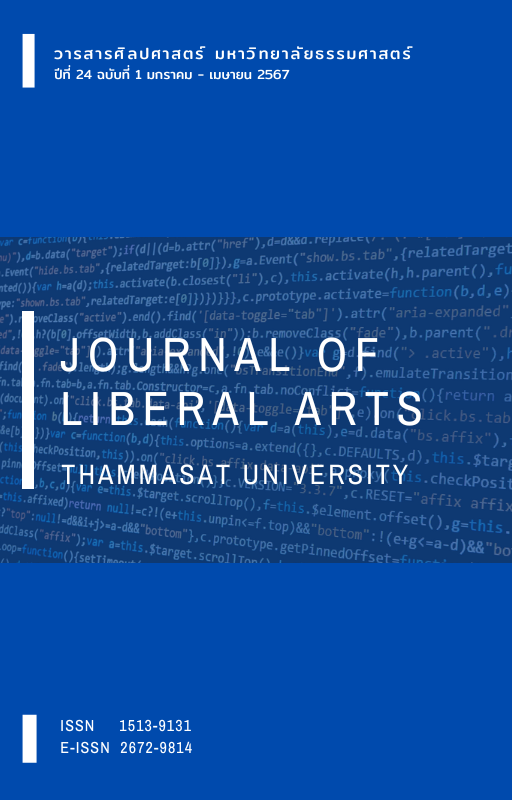Ummah Concept and its Application in International Relations
Main Article Content
Abstract
This research article entitled “The Ummah Concept and its Application in International Relations” aims to study the concept of Ummah in the Quran, its applications in international relations, and practical approaches to international relations in the Muslim world. This research is qualitative research that relies on document collection and literature review. Additionally, it relies on in-depth interviews with a purposive sampling of interviewees, i.e. specialists in Islamic history, political science, Muslim studies, and current issues and using descriptive analytics. The results of this research found that the concept of Ummah is mentioned in the Quran in many places. It gives a variety of meanings according to context and interpretation. The Ummah concept can be applied to international relations because it is a concept that gathers people in one place without limitations in terms of territory, ethnicity, language, etc. In addition, fully applying the Ummah concept will require cooperation from many Muslim countries to realize the true principles of the Ummah and their application to comprehensive politics, society, and economics.
Downloads
Article Details

This work is licensed under a Creative Commons Attribution-NonCommercial-NoDerivatives 4.0 International License.
References
จรัญ มะลูลีม. (11 พฤศจิกายน 2563). จุดเริ่มต้นของ “อุมมะฮ์”. มติชนสุดสัปดาห์. https://www.matichonweekly.com/column/article_368838
จุฑาทิพ คล้ายทับทิม. (2551). หลักความสัมพันธ์ระหว่างประเทศ. สำนักพิมพ์มหาวิทยาลัยเกษตรศาสตร์.
ซุฟอัม อุษมาน. (2558). อิสลามคือระบอบแห่งการดำเนินชีวิต. Islammore. https://www.islammore.com/view/3194
เดโช สวนานนท์. (2545). พจนานุกรมศัพท์การเมือง. หน้าต่างสู่โลกกว้าง.
สมาคมนักเรียนเก่าอาหรับประเทศไทย. (2545). พระมหาคัมภีร์อัลกุรอ่าน พร้อมความภาษาไทย. ศูนย์กษัตริย์ฟาฮัด เพื่อการพิมพ์อัลกุรอาน.
อิมรอน ซาเหาะ และ ยาสมิน ซัตตาร์. (2558). อิสลามการเมืองในเอเชียตะวันออกเฉียงใต้.วารสารมนุษยศาสตร์สังคมศาสตร์ มหาวิทยาลัยทักษิณ, 10(2), 65-88.
อิสมาอีล กอเซ็ม. (2558). การเป็นประชาชาติเดียวกัน (อุมมะห์วาฮิดะฮ์). Islammore. https://www.islammore.com/view/4258
อิสมาอีลลุตฟี จะปะกียา. (2549). อิสลาม ศาสนาแห่งสันติภาพ (ซุฟอัม อุษมาน, ผู้แปล). สํานักงานความร่วมมือเพื่อเผยแพร่และสอนอิสลามอัร-ร็อบวะฮฺ.
Ahmed, I. (2002). Rise and decline of the Muslim Ummah. Markazi Anjuman Khuddam-ul-Qur'an.
Ahsan, A. (1992). Ummah or nation identity crisis in contemporary Muslim society. The Islamic Foundation.
Asad, M. (1980). The message of the Quran. Dar al-Andalus.
As-Sayyid, R. (1984). Al-Ummah wal-jama’a was-sulta. Dar Iqra.
Habermas, J. (1998). The European nation-state: On the past and future of sovereignty and citizenship (C. Cronin, Trans.). Public Culture, 10(2), 399-416.
Hasan, M. (2011). Manifestations of globalization manifestations of globalization. Journal of Globalization Studies, 146-159.
Hassan, R. (2018). Religion, modernization and the Islamic Ummah. Jurnal Al-Tamaddun, Bil, 13(1), 57-64.
Hourani, A. (1992). A history of the Arab peoples. Warner Books.
Hussain, T. (2013). Principles of the Islamic political system. The Quranic Teachings. http://www.quranicteachings.org
Jomaa , K. A. (2021). Ummah a new paradigm for a global world. State University of New York Press.
Khan, M. A., & Nadvi, M. J. (2022). Foundations of political-collaboration between Muslim countries. academia.edu. https://www.academia.edu/4040862/Foundations_of_Political_Cooperation_between_Muslim_Countries
Moses, J. W. (2006). The Ummah of democracy. Security Dialogue, 37(4), 489-508.
Moten, A. R. (1996). Political science: An Islamic perspective. Palgrave Macmillan.
Naruzzaman, M. (2018). Western and Islamic international theories: A comparative analysis. International Studies, 55(2), 114-115.
Shariati, A. (1979). On the sociology of Islam: Lectures Hamid Algar (H. Algar, Trans.). Mizan press.
Thiry, L. (1981). Nation, state, sovereignty and self-determination. Peace Research, 13(1), 18-19.


